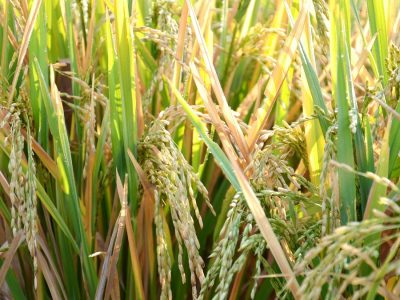Agritech business Estet Sepakat Sdn. Berhad, alongside pioneering Islamic fintech Ethis and its subsidiary GlobalSadaqah, and a re-takaful firm specialising in agriculture, are together exploring a Technical Collaboration Agreement to develop a parametric crop takaful plan to benefit more than 200 million paddy farmers across Asia, the key players in improving food security in the region.

Subscribe to our Telegram channel to get a daily dose of business and lifestyle news from NHA – News Hub Asia!
This programme is to enable the adoption of efficient and cost-effective methodologies of supporting paddy farmers when they face climate change risks and impact on their crops. Numerous reports have shown that natural disasters are costing farmers in the developing world billions of dollars each year, with drought emerging as the most destructive in a crowded field of threats that also includes floods, forest fires, storms, plant pests, animal diseases outbreaks, chemical spills and toxic algal blooms.
“Besides a significant pillar of Malaysian agricultural production, the rice sector is also an important source of employment, on top of being a daily staple food and a major source of calorie intake in the country. Despite this, paddy farmers are not equipped with the proper safeguards within their fields,” says Badardin Ahmad, the founder and principal advisor of Estet Sepakat. “We see this initiative as a way of bringing in more social value to the farmers beyond aiming to help increase paddy farmers’ income.”
As part of the first phase of this programme, about 25 million paddy farmers across Association of Southeast Asian Nations (ASEAN) countries are expected to benefit, which will help them have enough working capital after crop failure seasons. The programme is expected to be launched in April 2022 with the participation of local Takaful companies.
As part of its efforts to aid paddy farmers across ASEAN, Estet Sepakat has also recently penned an MoU with The Policies and Strategies for Social and Economic Development Foundation, an independent, not-for-profit organisation that focuses on the economic and social development of communities in Thailand which includes the Southern border region comprising Yala, Narathiwat, Pattani, Songkhla and Satun provinces with an estimate of 150,000 ha of paddy cultivation.
Through this MoU, both parties will collaborate and jointly identify issues faced by paddy farmers in Southern Thailand and implement formulated solutions. One such issue that Estet Sepakat aims to tackle, similar to in Malaysia, is to help the paddy farmers achieve a higher income by lowering their cultivation costs and improving their paddy production yield.
“The introduction of this collaboration will uplift the agriculture sector immensely, which in the context of Malaysia, is in line with RMK12’s and the National Agrofood Policy 2.0 for 2021-2030 (DAN 2.0) goal of boosting smart agriculture. But beyond that, this product will improve the accessibility that farmers have to traditional banking services and takaful coverage. Financial inclusion is at the core of both Ethis and GlobalSadaqah’s values and is our top priority,” says GlobalSadaqah Chief Executive Officer Ifran Tarmizi.
Besides this, the catalyst of such a product, Badardin says, includes the rice price crisis that occurred in 2007–2008, which created a widespread sense of urgency among policymakers and other rice stakeholders to forge coordinated efforts to avoid a repeat of such an experience.
Furthermore, the ongoing COVID-19 pandemic, coupled with various factors including conflict, socio-economic conditions, natural hazards, climate change and pests, has also resulted in a food security scare. The pandemic has led to severe and widespread increases in global food insecurity, affecting vulnerable households in almost every country, with the negative impact expected to continue through 2021, into 2022, and possibly beyond, according to the World Bank.
Member states of ASEAN play a major role in the global rice market. Over the next decade, the ASEAN region is projected to account for 53% of net exports, 14% of net imports, 29% of harvested area, 25% of total production, and 22% of total rice consumption of the global market. Rice is the major food staple in ASEAN countries and thus plays a significant role in the food security concerns of the region.
At the forefront of the food security cause in Malaysia
Estet Sepakat has launched its equity crowdfunding campaign (ECF) via Ethis Malaysia, the first fully-shariah compliant equity crowdfunding platform approved by the Securities Commission of Malaysia.
This is Estet Sepakat’ maiden investing campaign on an equity crowdfunding platform, and it is raising a minimum of RM1,400,000, offering investors up to a 9% stake in its company.
As part of its exit strategy, the company states that it will target to purchase the shares from investors at the end of year 2 on a first come first serve basis, giving investors a projected 16% yearly capital gain. Collectively and ideally, both the capital gain and the dividend will make up a projected annual ROI of 24% for investors. It intends to explore the possibility of an IPO in its fifth year and is offering an Investment Protection Plan to safeguard its investors.
Empowering Malaysian paddy farmers – the most fragmented player in the farming industry
Estet Sepakat hopes to improve the livelihoods of farmers in Malaysia by building a community of farmers that are data-centric and agri-tech driven. In addition to helping farmers, Estet Sepakat also wants to improve the country’s food security by enhancing the national rice production level.
According to Khazanah Research Institute’s latest report on the paddy and rice industry, farmers in Malaysia earned a household income of RM2,527 a month. This figure is strikingly below the national average of RM6,958 a month and also below the average B40 (bottom 40) income level in Malaysia. This disparity has been attributed to paddy farmers’ being the smallest and most fragmented player in the industry.
Other pressing issues faced by Malaysian farmers include:
- Small land size
- Low yield
- Inclement weather solutions
- Poor farm management knowledge and practice
Through these solutions, Estet Sepakat hopes to achieve the following:
- Increase paddy farmers’ income from RM2,500 to RM5,000 per month by reducing cultivation cost by 15%, improving paddy yield by 2 tons ha per season and increasing farm sizes to 6.5 ha per farmer.
- Increase paddy revenue multi-fold through the expansion of harvesting areas and revenue per ha. The harvesting area will grow at a projection of about 12,000 Ha in year one to about 190,000 Ha in year five.
- Increase the national rice production by an additional 400,000 tonnes; Malaysia currently produces 2.7 million tonnes of paddy nationally. This goal is in line with the government’s aim to raise paddy production by up to 75% to meet the country’s needs.
- Serve a larger farmer population and land area through BIDARATI’s fleet optimization and management software.
Interested in investing in Estet Sepakat? Read more about their campaign at https://bit.ly/3CBUOts.
Source: Ethis Malaysia(Press release)
Services
Stakeholder mapping, analysis, engagement and communication needs to be detailed to avoid business losses or even worse, a crisis. How can you do this effectively to prevent failure? ...
Data-driven business decisions have never been as crucial, especially in this era. MGBF leverages off, technology, experience and market presence to aid businesses in making accurate decisions. ...
MGBF provides comprehensive strategic advice and results-focused solutions to solve clients' problems in business-government relations so they can focus on their core business. ...
A critical business challenge is meeting the right decision-makers and potential buyers through the best channel and platform. How will you improve your business competency? ...
Upcoming Events
In this episode of 'A Working Lunch with Nordin', MGBF's Nordin Abdullah and regional commentator Eddin Khoo will discuss the biggest threats and opportunities for businesses as we look to manage change in the South China Sea.
This MGBF Roundtable will feature thought leaders form Japan, Australia, Singapore and Malaysia dealing with the critical issues of manipulation of public listed companies and government and their financial impacts.
A series of networking sessions with various business associations and trade organisations exploring high-value opportunities for business leaders and entrepreneurs looking to build the relationships that matter.
This integrated event will include a forum, dedicated business matching, site visits, a gala dinner and a round of golf. Aptly themed, the focus will be on regional food security issues and trends in the context of the supply chain, agriculture technology and trade regulations and policies.
MGBF In The News
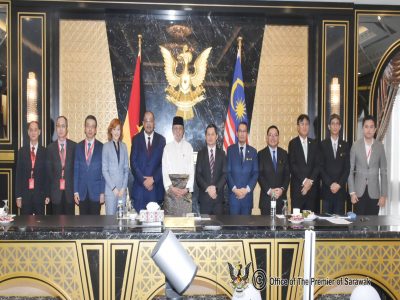
Planet QEOS and China Machinery Engineering Corporation (CMEC) are interested in investing RM10 billion to co-develop advanced Megawatt peak (MWp) agrovoltaic in Baram, to further boost Sarawak’s green energy initiative and food security. Sarawak Premier Datuk Patinggi Tan Sri Abang Johari Tun Openg was briefed on Friday by both the […]

Last week SPM results came out, 373,974 aspirants who have been waiting patiently over the last few months would now know their fate. Some 10,109 have received all A’s, the golden standard of academic success and the ticket to those looking to study the “more advanced” subjects in university. Proudly, […]

The classic knee-jerk reaction is to say, fire the coach, change the leadership of associations, and reduce the funding till they start performing better. This kind of negative reinforcement may work for kindergarten children, but we are dealing with high-performance adults – individuals much further along in their psychological and […]
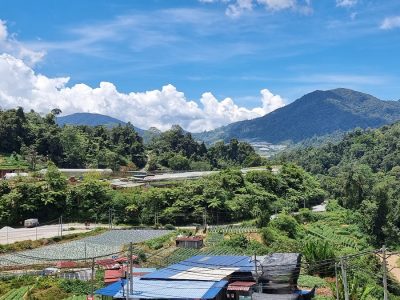
Since its earliest tea plantations in 1929, Cameron Highlands has grown to become a key player in the agricultural landscape of Malaysia, producing 40 per cent of all vegetables grown. Despite Malaysia shifting its economic focus away from agriculture, the industry remains imperative for food security and the livelihoods of […]
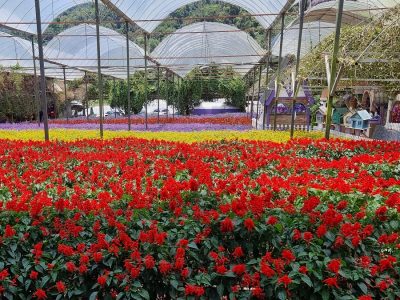
Although at first glance the travel industry and the agricultural sector appear to have nothing in common, they actually share more than meets the eye. The economic benefits of tourism to the agricultural sector can be multiplied several times over. “Tourism brings the end consumers closer to the source, which […]

The Malaysia Global Business Forum (MGBF) recently held a high-level roundtable themed ‘Designing the Future of the Digital Economy’, attended by industry leaders and business associations. The guest of honour was Yang Berhormat Syerleena Abdul Rashid, the Member of Parliament (MP) for Bukit Bendera in Penang. The MP’s Special Session […]

The Malaysia Global Business Forum (MGBF) will be hosting a roundtable on ‘Designing the Future of the Digital Economy’ on 23 February 2023. It is the culmination of the first three MGBF Exclusive Roundtable Series titled ‘The Evolving Threat Matrix in the Digital Economy’ held throughout 2022. According to the […]

The Founding Chairman of the Malaysia Global Business Forum (MGBF), Nordin Abdullah, today spoke on Bernama TV’s leading English talk show, The Brief, hosted by Jessy Chahal, on the topic of a stable political reality and what that means for the Malaysian economy. Nordin said, “The first thing that it […]

More than 1,100 years ago, Muhammad ibn Musa al-Khwarizmi was developing the mathematical formulas that we know today as algorithms which now have become so intertwined with the business fortunes of global media giants and the very fabric of geopolitics. A series of recent high level international reports have revealed […]

KSK Land has been recognised by the Malaysia Global Business Forum (MGBF) for its role in attracting high net-worth individuals to Malaysia post-pandemic. The first challenge in investor attraction is “selling” the country. In the context of Asia, Malaysia is competing with some very established investment destinations. The second […]

Malaysia, in particular Kuala Lumpur, continues to position itself as a regional centre to do business, educate a family and enjoy a global lifestyle. One company, KSK Land, has taken the lead in positioning itself and the city of Kuala Lumpur as a property investment destination for the global citizen […]
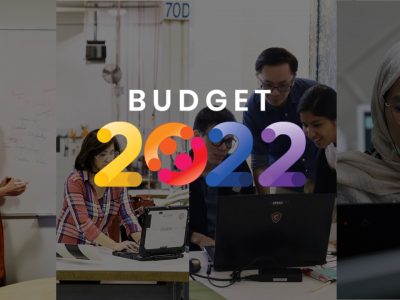
The upcoming budget represents an opportunity to build resilience in the critical sectors that will form the backbone of the country’s future-facing economic ambitions. This however needs to be achieved in the context of managing the community sectors most impacted by COVID-19 over the past two years. The Keluarga Malaysia (Malaysian Family) […]

Malaysia Global Business Forum (MGBF) has moved to support the creative economy as the overall economy moves into a recovery phase following the COVID19 pandemic. As a step in the direction of normalcy, the MGBF has agreed to host the art exhibition “I Know You’re Somewhere So Far” by one […]
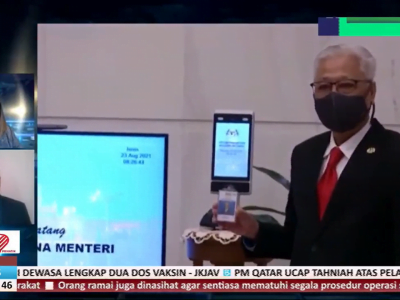
Congratulations to Datuk Seri Ismail Sabri Yaakob for taking up the mantle of the ninth prime minister of Malaysia. There is nothing normal about the situation; it could not have been scripted but it has kept the spectrum of media, mainstream and social, gripped. The first order of business for […]

In a stirring speech to the nation, President Joseph R. Biden, Jr. stamped his brand of leadership on the presidency, in his first act as the 46th president of the United State of America, it signaled several shifts. Perhaps the weather was foreboding with snow falling before the ceremony that […]
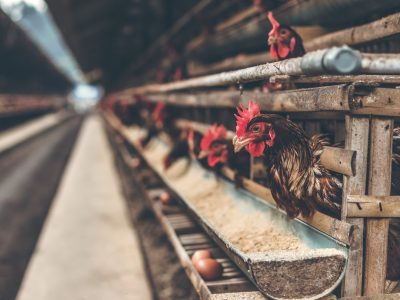
KUALA LUMPUR, 6 July 2022 – As the global economy continues to deal with unprecedented levels of disruption caused by the pandemic and the conflict between Russia and Ukraine, the convergence of energy security and food security issues has become a front-of-mind issue faced by policy makers and consumers alike. […]

KUALA LUMPUR, 23 June 2022 — Malaysia Global Business Forum (MGBF) ties up with scoutAsia to ensure that businesses are equipped with deeper regional insights. The past two years has seen a massive shift in the way businesses are conducted with digitisation, digitalisation and automation continuously being adopted to improve […]

KUALA LUMPUR, 25 May 2022 – The Malaysia Global Business Forum (MGBF)’s exclusive roundtable on ‘Security Concerns in Critical Value Chains’ was held in a hybrid setting yesterday at the Eastin Hotel Kuala Lumpur. The guest of honour was Yang Berbahagia Tan Sri Dato’ Seri Rafidah Aziz, former minister of […]
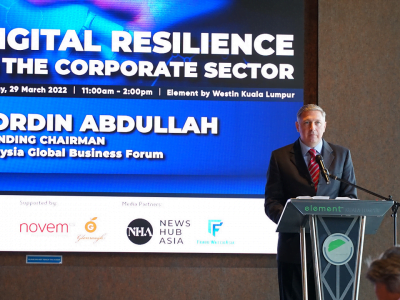
We live in the age of crisis. At the heart of any crisis is the threat of rapid change. Change too deep or too wide that the current coping mechanisms for an individual, corporation or government are unable to remain resilient. An unwelcome paradigm shift, like the proverbial spider, that […]










